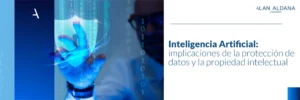The era of software and algorithms is a reality, not only for the world of commerce. It is beginning to become an everyday occurrence in the professional practice of many careers and has even permeated quite strongly in law. The growth of software and algorithms has already been observed since last year. of the technological impact on the lawyer's lifeThe company's legal department has decided to join the wave of technological change by adopting new ways of executing tasks, simplifying procedures and increasing the possibility of storing information.
The introduction of Blockchain technology has brought new ideas and solutions to the need to decentralize processes and offer more autonomy. In order to take advantage of these tools, the smart contract or smart contract in law emerged, which provides the ability to self-execute without the mediation of third parties and also offers immutability and distributed storage.
Smart Contracts
A contract is an agreement between two or more parties in which the actions and competencies of each party are clearly defined. By accepting the established rules, each party is responsible for its actions and is aware of the consequences it will have to assume in case of breaking the rules.
Traditionally, legally valid contracts require, in addition to legal advice, the services of a notary's office, which represents more cost in time and resources. Smart contracts, on the other hand, can be executed and enforced by themselves, without the need for intermediaries to validate them. In this way, they avoid the ambiguities of interpretation because they are not subject to the written language with which traditional contracts are drafted by legal professionals. In these contracts, the information is encoded in computer codes written in programming language.
Autonomy for the validity of smart contracts is precisely linked to its nature, since it is a code that is visible to all interested parties and cannot be modified by using the blockchain technology.
The fact that it is distributed on computers prevents it from being kept in custody or owned by a single company, which would result in the elimination of bureaucratic hurdles, reduction of economic costs and time in the process. In order for smart contracts to be executed on a daily basis, programmable transactions and a financial system that recognizes them as legal must exist. Smart contracts began to be used through the Bitcoin digital currencyto generate agreements between the people interested in obtaining it.
In short, smart contracts are defined as a set of immutable programmed codes. and distributed in thousands of nodes in such a way that they cannot alter their content. In this sense, it is a program that will always act in the same way, allowing information to be stored without being able to be modified. When a programmed condition occurs in the system, the smart contract automatically executes the corresponding clause. They can be very secure, as long as they are not created with programming errors, since there its security can be violated and execution failures can be generated.
In spite of the great benefits and the resources that technology makes available to optimize processesIn order to achieve the correct codification of these contracts, legal advice and the knowledge of legal professionals is a step that should not be skipped, since it is necessary to have the expertise of a lawyer to achieve the correct codification of these contracts.
Some experts in the area have defined some of the uses that can be given to smart contracts, these are:
- Loans.
- Settlement of operations.
- Coupon or bond payments.
- Microinsurance.
- Security deposit in the land registry.
- Inheritances.
- Automation of payments and donations.
- Electronic medical records.
- Access to population health data.
- Personal health follow-up.
- Intellectual property services.













